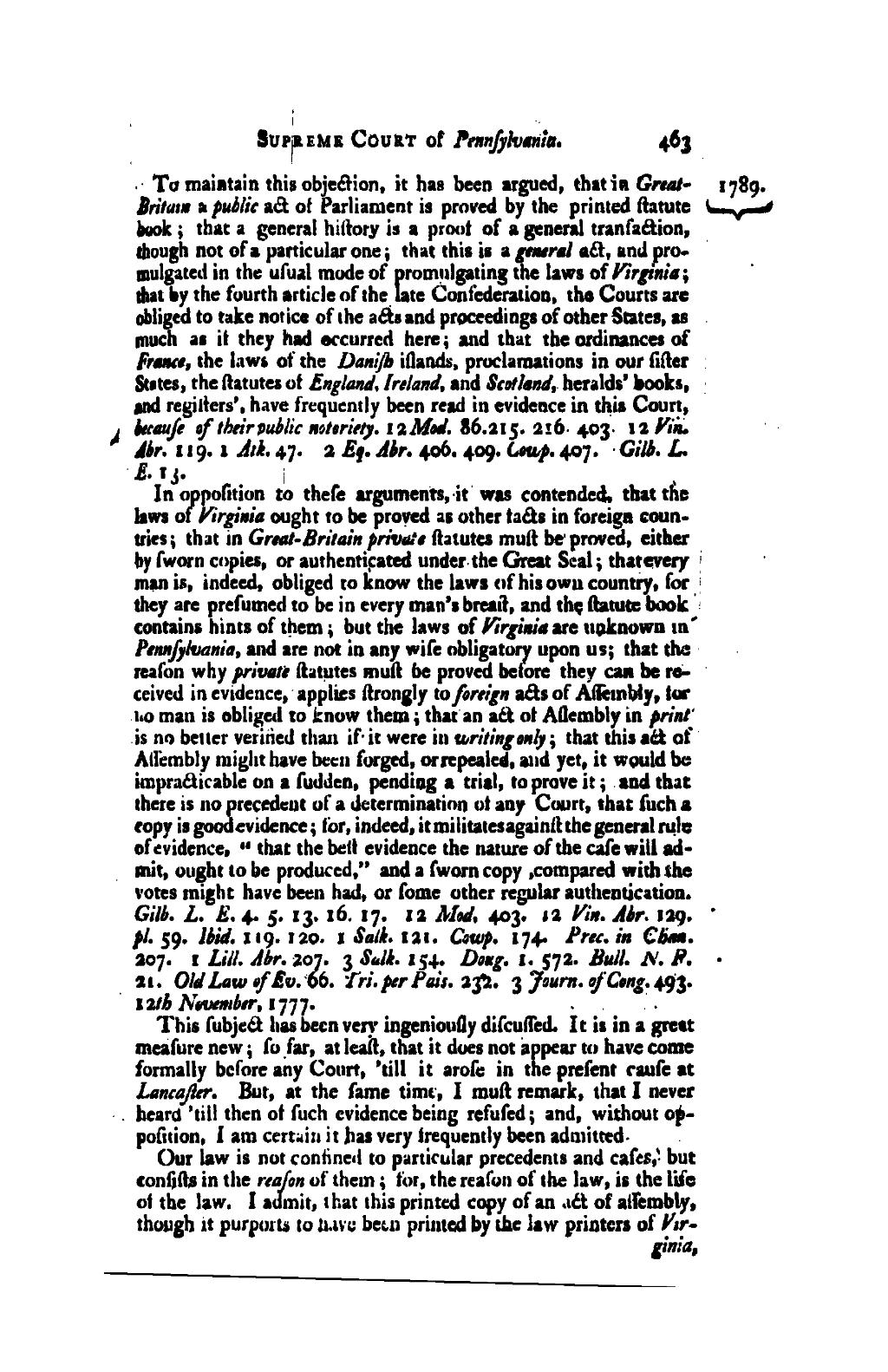1789.![]()
To maintain this objection, it has been argued, that in Great-Britain a public act of Parliament is proved by the printed ftatute book ; that a general hiftory is a proof of a general tranfaction, though not of a particular one ; that this is a general act , an promulgated in the ufual mode of promulgating the laws of Virginia ; that by the fourth article of the late Confederation, the Courts are obliged to take notice of the acts and proceedings of other States, as much as if they had occurred here ; and that the ordinances of France the laws of the Daniʃh iflands, proclamations in our fifter States, the ftatutes of England, Ireland and Scotlad, heralds' books, and regifters' , have frequently been read in evidence in this Court, becauʃe oƒ their public notoriety. 12 Mod. 86. 215. 216. 403. 12Vin. Abr. 119. 1 Atk 47 2 Eq. Abr. 406. 409. Cowp. 407. Gilb. L. E. 18.
In oppofition to thefe arguments, it was contended that the laws of Virginia ought to be proved as other facts in foreign countries ; that in Great-Britain private ftatutes muft be proved, either by fworn copies, or authenticated under the Great Seat ; that every man is, indeed, obliged to know the laws of his own country, for they are prefumed to be in every man's breaft, and the ftatute book contains hints of them ; but the laws of Virginia are unknown in Pennʃylvania, and are not in any wife obligatory upon us ; that the reafon why private ftatues must be proved before they can be received in evidence, applies ftrongly to ƒoreign acts of Affembly, for no man better verified than if it were in writing only ; that this act of Affembly might have been forged, or repealed, and yet, it would be impracticable on a fudden, pending a trial, to prove it ; and that there is no precedent of a determination of any Court, that fuch a copy is good evidence ; for, indeed, it militates againft the general rule of evidence, “ that the beft evidence the nature of the cafe will admit, ought to be produced.” and a fowrn copy, compared with the votes might have been had, or fome other regular authentication. Gilb. L. E. 4. 5. 13. 16. 17. 12 Mod. 403. 12 Vin. Abr. 129. pl. 59. Ibid. 109, 120. 1 Salk. 121. Cowp. 174. Prec. in Chan. 207. 1 Lill. Abr. 207. 3 Salk. 154. Doug. 1 .572. Bull. N.P. 21. Old Law oƒ Ev. 66. Tri. per Pais. 232. 3 Journ. oƒ Cong. 493. 12th November, 1777.
This fubject has been very ingenioufly difcuffed. It is in a great meafure new ; fo far, at leaft, that it does not appear to have come formally before any Court, ’till it arofe in the prefent caufe at Lancaʃter. But, at the fame time, I muft remark, that I never heard ’till then of fuch evidence being refufed ; and, without oppofition, I am certain it has very frequently been admitted.
Our law is not confined to particular precedents and cafes, but confifts in the reaʃon of them ; for, the reafon of the law, is the life of the law. I admit, that this printed copy of an act of affembly, though it purports to have been printed by the law printers of Vir-
ginia,
